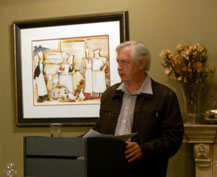Latest News Archive
Please select Category, Year, and then Month to display items
04 April 2024
|
Story Lunga Luthuli
|
Photo SUPPLIED
 Dr Juliet Kamwendo champions gender-inclusive climate action in Africa. Her expertise at the recently held AFR100 workshop highlighted vital steps towards sustainable and equitable development.
Dr Juliet Kamwendo champions gender-inclusive climate action in Africa. Her expertise at the recently held AFR100 workshop highlighted vital steps towards sustainable and equitable development.
Dr Juliet Kamwendo, Lecturer and Programme Director for Gender Studies in the Centre for Gender and Africa Studies at the University of the Free State, is spearheading efforts to integrate gender considerations into Africa's climate restoration agenda. Reflecting on her involvement, Dr Kamwendo stated, "This is particularly crucial, as women make up almost 50% of the population in Africa, and the depletion and degradation of land affect them disproportionately."
She recently served as a gender expert at the AUDA-NEPAD AFR100 workshop in Ouagadougou, Burkina Faso, from 25 to 29 March 2024. This initiative aims to restore forests and degraded land across Africa by 2030, with a focus on gender equality.
The workshop emphasised the integration of gender perspectives into the AFR100 project, acknowledging the disproportionate impact of land degradation on women. Dr Kamwendo's expertise highlighted the need to empower women in climate change interventions, addressing existing gender inequalities exacerbated by environmental degradation.
“Women – who are primarily responsible for household food security and water provision – bear the brunt of environmental degradation, leading to increased workloads, reduced income opportunities, and heightened vulnerability to climate-related disasters. Furthermore, the loss of forest cover and biodiversity further exacerbates the challenges faced by women, particularly in rural areas where they depend heavily on natural resources for their livelihoods,” added Dr Kamwendo.
Her participation highlights academia's crucial role in fostering inclusive and sustainable development, emphasising interdisciplinary collaboration to tackle complex environmental challenges. Through initiatives such as AFR100, stakeholders are working towards a more resilient and gender-responsive future for Africa.
Afrikaans place names were not only given by Afrikaner people, says professor.
2012-09-25
 |
Prof. Peter Raper delivering his lecture on South African place names.
25 September 2012 |
Prof. Peter Raper, honorary professor at the Department of Linguistics and Language Practice, delivered a public lecture in Clarens earlier this month. The theme of the lecture was “From Stone Age to GPS: The fourth edition of the South African Place Names Dictionary”.
Prof. Raper shared the historical development of the project as well as the challenges and other interesting observations associated with the topic. He elaborated on the dramatic change in the focus of his research on place names in South Africa.
It was previously assumed that all of the Afrikaans place names were given by the Afrikaner people and that changing these place names was consistent with the mandate of the South African Geographical Names Council (SAGNC) to transform place names. Prof. Raper said more in-depth research revealed that a significant number of place names are actually translations of original San names – into Afrikaans, Khoi and the Bantu languages. He told the audience that given the constitutional stipulation that no cultural group’s heritage may be removed, this discovery calls into the question the modus operandi of the SAGNC.
Prof. Raper’s lecture was part of the conference programme of the Third International MIDP IV Symposium that took place on the Qwaqwa campus. The MIDP (Multilingual Information Development Programme) is a project sponsored by the Province of Antwerp. The theme for this year’s symposium was “Multilingualism for Empowerment” and was presented in collaboration with the University of Antwerp.